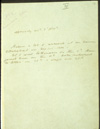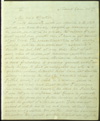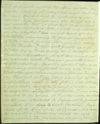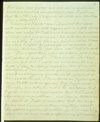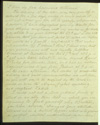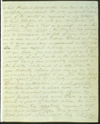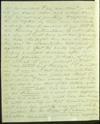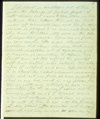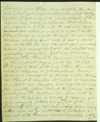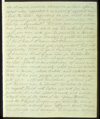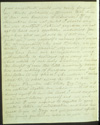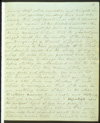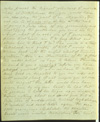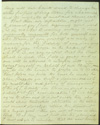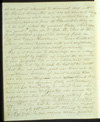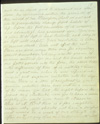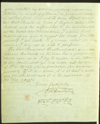Mahatma Letter No. 5
| Quick Facts | |
|---|---|
| People involved | |
| Written by: | Koot Hoomi |
| Received by: | A. P. Sinnett |
| Sent via: | H. P. Blavatsky |
| Dates | |
| Written on: | October 27-29, 1880 See below. |
| Received on: | November 1-5, 1880 See below. |
| Other dates: | unknown |
| Places | |
| Sent from: | Amritsar, India |
| Received at: | Allahabad, India |
| Via: | unknown |
This is Letter No. 5 in The Mahatma Letters to A. P. Sinnett, 4th chronological edition. It corresponds to Letter No. 4 in Barker numbering. Letter No. 6 seems to be a postscript to this letter. See below for Context and background. Master K.H. wrote to A. P. Sinnett advising how to deal with the embarrassment of some English friends, after Henry Steel Olcott published an account of how they had witnessed phenomena at Simla.
< Prev letter chrono
Next letter chrono >
< Prev letter Barker
Next letter Barker >
Cover sheet
|
Apparently received 5th November {1880}. Madam and Colonel O. arrived at our house, Allahabad, on December the 1st, 1880. Col. O. went to Benares on the 3rd — Madam joined him on the 11th. Both returned to Allahabad on 20th and stayed until 28th. |
NOTES:
|
Page 1 transcription, image, and notes
|
Amrita Saras, Oct. 29. My dear Brother, I could assuredly make no objection to the style which you have kindly adopted, in addressing me by name, since it is, as you say, the outcome of a personal regard even greater than I have as yet deserved at your hands. The conventionalities of the weary world, outside our secluded "ashrums," trouble us but little at any time; least of all now, when it is men not ceremony-masters, we seek, devotion, not mere observances. More and more a dead formalism is gaining ground, and I am truly happy to find so unexpected an ally in a quarter where, hitherto there have not been too many — among the highly educated classes of English Society. A crisis, in a certain sense, is upon us now, and must be met. I might say two crises — one, the Society's, the other for Tibet. For, I may tell you in confidence, that Russia is gradually massing her forces for a future invasion of that country under the pretext of a Chinese War. If she does not succeed it will be due to us; and herein, at least we will deserve your gratitude. You see then, that we have weightier matters than small societies to think about; yet, the |
|
NOTES:
|
Page 2
|
T.S. must not be neglected. The affair has taken an impulse, which, if not well guided, might beget very evil issues. Recall to mind the avalanches of your admired Alps, that you have often thought about, and remember that at first their mass is small and their momentum little. A trite comparison you may say, but I cannot think of a better illustration, when viewing the gradual aggregation of trifling events, growing into a menacing destiny for the Theos. Soc. It came quite forcibly upon me the other day as I was coming down the defiles of Kouenlun — Karakorum you call them — and saw an avalanche tumble. I had gone personally to our chief to submit Mr. Hume's important offer, and was crossing over to Lhadak on my way home. What other speculations might have followed I cannot say. But just as I was taking advantage of the awful stillness which usually follows such cataclysm, to get a clearer view of the present situation and the disposition of the "mystics" at Simla, I was rudely recalled to my senses. A familiar voice, as shrill as the one attributed to Saraswati's peacock — which, if we may credit tradition, frightened off the King of the Nagas — shouted along the currents "Olcott has raised the very devil again! . . . The Englishmen are going crazy. . . . |
NOTES:
|
Page 3
|
Koot Hoomi, come quicker and help me!" — and in her excitement forgot she was speaking English. I must say, that the "Old Lady's" telegrams do strike one like stones from a catapult! What could I do but come? Argument through space with one who was in cold despair, and in a state of moral chaos was useless. So I determined to emerge from the seclusion of many years and spend some time with her to comfort her as well as I could. But our friend is not one to cause her mind to reflect the philosophical resignation of Marcus Aurelius. The fates never wrote that she could say: "It is a royal thing, when one is doing good to hear evil spoken of himself." . . . I had come for a few days, but now find that I myself cannot endure for any length of time the stifling magnetism even of my own countrymen. I have seen some of our proud old Sikhs drunk and staggering over the marble pavement of their sacred Temple. I have heard an English-speaking Vakil declaim against Yog Vidya and Theosophy, as a delusion and a lie, declaring that English Science had emancipated them from such "degrading superstitions," and saying that it was an insult to India to maintain that the dirty Yogees and Sunnyasis knew anything about the mysteries of nature; or that any living man can or ever could perform any phenomena! |
NOTES:
|
Page 4
|
I turn my face homeward to-morrow. The delivery of this letter may very possibly be delayed for a few days, owing to causes which it will not interest you for me to specify. Meanwhile, however, I have telegraphed you my thanks for your obliging compliance with my wishes in the matters you allude to in your letter of the 24th inst. I see with pleasure, that you have not failed to usher me before the world as a possible "confederate." That makes our number ten I believe? But I must say, that your promise was well and loyally fulfilled. Received at Umritsur on the 27th inst., at 2 p.m., I got your letter about thirty miles beyond Rawul Pindee, five minutes later, and had an acknowledgment wired to you from Jhelum at 4 p.m. on the same afternoon. Our modes of accelerated delivery and quick communications are not then, as you will see, to be despised by the Western world, or even the Aryan, English-speaking and skeptical Vakils. I could not ask a more judicial frame of mind in an ally than that in which you are beginning to find yourself. My Brother, you have already changed your attitude toward us in a distinct degree: what is to prevent a perfect mutual understanding one day! |
|
NOTES:
|
Page 5
|
Mr. Hume's proposition has been duly and carefully considered. He will, no doubt, advise you of the results as expressed in my letter, to him. Whether he will give our "modes of action" as fair a trial as yourself — is another question. Our Māha (the "Chief") has allowed me to correspond with both of you, and even — in case an Anglo-Indian Branch is formed — to come some day in personal contact with it. It now depends entirely on you. I cannot tell you more. You are quite right as to the standing of our friends in the Anglo-Indian world having been materially improved by the Simla visit; and, it is also true, though you modestly refrain from saying so, that we are mainly indebted to you for this. But quite apart from the unlucky incidents of the Bombay publications, it is not possible that there should be much more at best than a benevolent neutrality shown by your people toward ours. There is so very minute a point of contact between the two civilisations they respectively represent, that one might almost say they could not touch at all. Nor would they but for |
|
NOTES:
|
Page 6
|
the few — shall I say eccentrics? — who, like you, dream better and bolder dreams than the rest; and provoking thought, bring the two together by their own admirable audacity. Has it occurred to you that the two Bombay publications, if not influenced, may at least have not been prevented, by those who might have done so, because they saw the necessity for that much agitation to effect the double result of making a needed diversion after the brooch grenade, and, perhaps, of trying the strength of your personal interest in occultism and theosophy? I do not say it was so; I but enquire whether the contingency ever presented itself to your mind. I have already caused it to be intimated to you that if the details given in the stolen letter had been anticipated in the Pioneer — a much more appropriate place, and where they would have been handled to better advantage — that document would not have been worth anyone's while to purloin for the Times of India, and therefore no names would have appeared. |
NOTES: |
Page 7
|
Colonel Olcott is doubtless "out of time with the feelings of English people" of both classes; but nevertheless more in time with us than either. Him we can trust under all circumstances, and his faithful service is pledged to us come well, come ill. My dear Brother, my voice is the echo of impartial justice. Where can we find an equal devotion? He is one who never questions, but obeys; who may make innumerable mistakes out of excessive zeal but never is unwilling to repair his fault even at the cost of the greatest self-humiliation; who esteems the sacrifice of comfort and even life something to be cheerfully risked whenever necessary; who will eat any food, or even go without; sleep on any bed, work in any place, fraternise with any outcast, endure any privation for the cause. . . . I admit that his connection with an A. I. Branch would be "an evil" — hence, he will have no more to do with it than he has with the British, (London Branch). His connection will be purely nominal, and may be made more so, by |
|
NOTES: |
Page 8
|
framing your Rules more carefully than theirs; and giving your organization such a self-acting system of Government as would seldom if ever require any outside interference. But to make an independent A.I.B. with the self-same objects, either in whole or apart, as the Parent Society and with the same directors behind the scenes would be not only to deal a mortal blow at the Theos. Soc. but also put upon us a double labour and anxiety without the slightest compensating advantage that any of us can perceive. The Parent S. has never interfered in the slightest degree with the British T.S., nor indeed with any other Branch, whether religious or philosophical. Having formed, or caused to be formed a new branch, the Parent S. charters it (which it cannot now do without our Sanction and signatures), and then usually retires behind the scenes, as you would say. Its further connection with the subject branches is limited to receiving quarterly accounts of their doings and lists of the new Fellows, Ratifying expulsions — only when specially called upon as an arbitrator to interfere on account of the Founders' direct connection with us — etc., |
NOTES:
|
Page 9
|
etc.; it never meddles otherwise in their affairs except when appealed to as a sort of appelate court. And the latter depending on you, what is there to prevent your Society from remaining virtually independent? We are, even more generous than you British are to us. We will not force upon, nor even ask you to sanction a Hindu "Resident" in your Society, to watch the interests of the Parent Paramount Power when we have once declared you independent; but will implicitly trust to your loyalty and word of honour. But if you now so dislike the idea of a purely nominal executive supervision by Col. Olcott — an American of your own race — you would surely rebel against dictation from a Hindu, whose habits and methods are those of his own people, and whose race, despite your natural benevolence, you have not yet learnt to tolerate, let alone to love or respect. Think well before you ask for our guidance. Our best, most learned and highest adepts are of the races of the "greasy Tibetans"; and the Penjabi Singhs — you know the lion is proverbially a dirty and offensive beast, despite his strength and courage. Is it certain that your |
NOTES:
|
Page 10
|
good compatriots would more easily forgive our Hindu solecisms in manners than those of their own kinsmen of America? If my observations have not misled I should say this was doubtful. National prejudices are not apt to leave one's spectacles undimmed. You say "how glad we should be, if that one (to guide you) were yourself," meaning your unworthy correspondent. My good Brother, are you certain, that the pleasant impression you now may have from our correspondence, would not instantly be destroyed upon seeing me? And which of our holy Shaberons has had the benefit of even the little university education and inkling of European manners that has fallen to my share? An instance: I desired Mad. B. to select among the two or three Aryan Punjabees who study Yog Vidya, and our natural mystics, one, whom — without disclosing myself to him too much I could designate as an agent between yourself and us, and whom I was anxious to dispatch to you, with a letter of introduction, and have him speak to you of Yoga and its practical effects. This young gentleman who is as pure as |
NOTES:
|
Page 11
|
purity itself, whose aspirations and thoughts are of the most spiritual ennobling kind, and who merely through self-exertion is able to penetrate into the regions of the formless worlds — this young man is not fit for — a drawing-room. Having explained to him that the greatest good might result for his country if he helped you to organize a Branch of English mystics by proving to them practically to what wonderful results led the study of Yog, Mad. B. asked him in guarded and very delicate terms to change his dress and turban before starting for Allahabad — for, though she did not give him this reason, they were very dirty and slovenly. You are to tell Mr. Sinnett — she said — that you bring him a letter from our Brother K., with whom he corresponds. But, if he asks you anything either of him or the other Brothers answer him simply and truthfully that you are not allowed to expatiate upon the subject. Speak of Yog and prove to him what powers you have attained. This young man who had consented wrote later on the following curious letter: "Madam," he said, "you who |
|
NOTES: |
Page 12
|
preach the highest standards of morality, of truthfulness, etc., you would have me play the part of an imposter. You ask me to change my clothes at the risk of giving a false idea of my personality and mystifying the gentleman you send me to. And what if he asks me if I personally know Koot'hoomi, am I to keep silent and allow him to think I do? This would be a tacit falsehood, and guilty of that, I would be thrown back into the awful whirl of transmigration!" Here is an illustration of the difficulties under which we have to labour. Powerless to send to you a neophyte before you have pledged yourself to us — we have to either keep back or despatch to you one who at best would shock if not inspire you at once with disgust! The letter would have been given him by my own hand; he had but to promise to hold his tongue upon matters he knows nothing about and could give but a false idea of, and to make himself look cleaner. Prejudice and dead letter again. For over a thousand years, — says Michelet, — the Christian Saints never washed themselves! For how |
NOTES:
|
Page 13
|
long will our Saints dread to change their clothes for fear of being taken for Marmaliks and the neophytes of rival and cleaner sects! But these, our difficulties, ought not to prevent you from beginning your work. Colonel O. and Mad. B. seeming willing to become personally responsible for both yourself and Mr. Hume, if you yourself are ready to answer for the fidelity of any man your party may choose as the leader of the A.I.T.S., we are content that the trial shall be made. The field is yours and no one will be allowed to interfere with you except myself on behalf of our Chiefs when you once do me the honour to prefer me to the others. But before one builds the house he makes the plan. Suppose you draft a memorandum as to the constitution and policy of management of the A.I. Society you have in mind and submit it for consideration? If our Chiefs agree to it — and it is not surely they who would show themselves obstructive in the universal onward march, or retard this movement to a higher goal — then you will at once be chartered. But they must first see the plan; and I must ask you to remember that the new Society |
NOTES:
|
Page 14
|
shall not be allowed to disconnect itself with the Parent Body, though you are at liberty to manage your affairs in your own way without fearing the slightest interference from its President so long as you do not violate the general Rules. And upon this point I refer you to Rule IX. This is the first practical suggestion coming from a Cis and Trans-Himalayan "cave-dweller" whom you have honoured with your confidence. And now about yourself personally. Far be it from me to discourage one so willing as yourself by setting up impossible barriers to your progress. We never whine over the inevitable but try to make the best of the worst. And though we neither push nor draw into the mysterious domain of occult nature those who are unwilling; never shrink from expressing our opinions freely and fearlessly, yet we are ever as ready to assist those who come to us; even to — agnostics who assume the negative position of "knowing nothing but phenomena and refuse to believe in anything else." It is true that the married man cannot be an adept, yet without striving to become "a Raja Yogi" he can acquire certain powers |
NOTES:
|
Page 15
|
and do as much good to mankind and often more, by remaining within the precincts of this world of his. Therefore, shall we not ask you to precipitately change fixed habits of life, before the full conviction of its necessity and advantage has possessed you. You are a man to be left to lead himself, and may be so left with safety. Your resolution is taken to deserve much: time will effect the rest. There are more ways than one for acquiring occult knowledge. "Many are the grains of incense destined for one and the same altar: one falls sooner into the fire, the other later — the difference of time is nothing," remarked a great man when he was refused admission and supreme initiation into the mysteries. There is a tone of complaint in your question whether there ever will be a renewal of the vision you had, the night before the picnic day. Methinks, were you to have a vision nightly, you would soon cease to "treasure" them at all. But there is a far weightier reason why you should not have a surfeit — it would be a waste of our strength. As often as I, or any of us can communicate with |
NOTES: |
Page 16
|
you, whether by dreams, waking impressions, letters (in or out of pillows) or personal visits in astral form — it will be done. But remember that Simla is 7,000 feet higher than Allahabad, and the difficulties to be surmounted at the latter are tremendous. I abstain from encouraging you to expect too much, for, like yourself, I am loathe to promise what, for various reasons, I may not be able to perform. The term "Universal Brotherhood" is no idle phrase. Humanity in the mass has a paramount claim upon us, as I try to explain in my letter to Mr. Hume, which you had better ask the loan of. It is the only secure foundation for universal morality. If it be a dream, it is at least a noble one for mankind: and it is the aspiration of the true adept. Yours faithfully, |
NOTES:
|
Context and background
Olcott thought Sinnett should immediately publish reports of all the Simla phenomena in The Pioneer. When this didn’t happen, he wrote an article entitled “A Day with Madame Blavatsky” in which he described some of these phenomena. In this article he mentioned the names of several prominent Englishmen who had been present on these occasions. He sent the story to Bombay, to Damodar Mavalankar, who was in charge of headquarters during the absence of the founders, to be reproduced and circulated among local members of the Theosophical Society.
Unfortunately, the Times of India somehow got hold of a copy and published it, along with some abusive comments. Damodar wrote a protest which the Times refused to publish. However, the Bombay Gazette did publish a sharp rejoinder by H.P.B.
The persons whose names Col. Olcott had mentioned in his article were extremely embarrassed and unhappy about the publicity, and of course the whole thing boomeranged on H.P.B. She became frantic and sent a call for help to the Mahatma K.H. She and the Colonel were in Amritsar at the time.
At this time, the Mahatma K.H. was en route — in his physical body — through Ladakh on his return from a visit to the Mahachohan to consult with him concerning some developments mentioned in the first paragraph of this letter as well as about the letter which he (K.H.) had received from Hume. When he heard H.P.B.’s frantic cry for help, he decided to change his route and go to see her.
Phenomena
Before Sinnett left Simla, he sent a registered letter to H.P.B. at Amritsar, to be forwarded to the Mahatma K.H. (This was in addition to the short note about the “Pillow Incident” mentioned in Mahatma Letter No. 4.)
H.P.B. received the registered letter on October 27 and sent it on to K.H. by occult means as soon as she received it; the time was fixed by the postal register as 2:00 p.m. The Mahatma K.H. was on board a train (in what is now Pakistan) en route to see her.
He received the letter at 2:05 p.m. near Rawalpindi. At the next station (Jhelum) he got off the train, went into the telegraph office, and wrote out a telegram of acknowledgment to Sinnett, which was, of course, dated and filed by the telegraph agent.
The Master also instructed H.P.B. to return to Sinnett the envelope in which the letter had been received, which showed the date and time of the registration. At first, Sinnett could not understand why he was to save this old envelope but save it he did, and later he saw the connection: the date and time of the letter’s registration and the date and time of the sending of the telegram showed that the letter could not have reached him by other than occult means. Later, the Mahatma asked Sinnett to get the handwritten copy of the telegram, which Sinnett finally did, and it is among the Mahatma Letters in the British Library (before 1973, in British Museum). Thus Sinnett was made aware that H.P.B. had managed a very quick transmission of his letter across some hundreds of miles.
Thus, it seems, the Mahatma K.H. was willing to give Sinnett another bit of proof of his existence, and something of his powers. The whole incident is one of the most convincing pieces of evidence anywhere in the literature.
Physical description of letter
The original letter in in Folio 1 at the British Library. According to George Linton and Virginia Hanson:
In dull black ink on both sides of 8 sheets of full-sized white paper. The script varies somewhat in weight and appearance. The signature is in four separate parts. The "K" has a backward turned curl at the top of the upper arm. Beneath the signature, in Devanagari characters, is a transliteration of "Koot Hoomi Lal Singh."[1]
Publication history
Commentary about this letter
Notes
- ↑ George E. Linton and Virginia Hanson, eds., Readers Guide to The Mahatma Letters to A. P. Sinnett (Adyar, Chennai, India: Theosophical Publishing House, 1972), 41.
